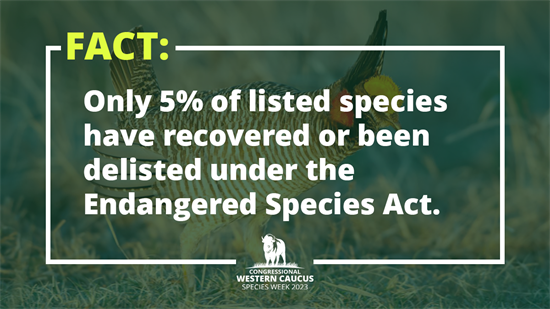Today, Congressional Western Caucus Chairman Dan Newhouse (R-WA) and Senate Western Caucus Chair Cynthia Lummis (R-WY) introduced legislation to prevent the Departments of the Interior and Commerce from finalizing three rule proposals and retain the Trump-era regulations within the Endangered Species Act (ESA). The legislation will preserve legal clarity to landowners and businesses out west while also ensuring that the ESA effectively manages wildlife.
“For far too long, radical environmental activists have weaponized the Endangered Species Act against farmers, ranchers, landowners, and rural communities while recovering less than five percent of species listed over the last 50 years,” said Chairman Newhouse. “The proposed rules from Biden’s Fish and Wildlife Service will only encourage further disruptions by activists and make it even more difficult for true conservationists to assist with species recovery. As Chairman of the Western Caucus, I’m proud to introduce legislation along with Senator Lummis to prevent these egregious rules from taking effect and to steer the ESA back to its intended purpose of helping species recover without being a barrier to prosperity for our rural communities.”
“Abandoning clear and well-functioning Trump-era reforms in favor of a one-size-fits-all mandate from disconnected Washington bureaucrats underscores just how out of touch this administration is with western priorities,” said Senator Lummis. “Our landowners and ranchers need certainty, not unnecessary regulatory headaches. This administration continues to tout confusing and less effective policies that ultimately hurt the west. The Biden administration needs to stop this big government exercise of forgoing a solution in search of a problem and stick with what is already working.”
The legislation in the House is cosponsored by U.S. Representatives Lauren Boebert (R-CO), Harriet Hageman (R-WY) and Jerry Carl (R-AL). The legislation in the Senate is cosponsored by U.S. Senators Roger Marshall (R-KS), Mike Crapo (R-ID), Jim Risch (R-ID), Roger Wicker (R-MS), Pete Ricketts (R-NE), John Barrasso (R-WY), Deb Fischer (R-NE), Kevin Cramer (R-ND), Steve Daines (R-MT), Dan Sullivan (R-AK), Jerry Moran (R-KS), John Hoeven (R-ND) Mike Rounds (R-SD), Mike Lee (R-UT), James Lankford (R-OK) and Ted Cruz (R-TX).
The legislation is also supported by the American Farm Bureau Federation and the National Endangered Species Act Reform Coalition.
Click here to read the bill text.
Background:
In 2019, The Trump administration finalized key changes to the Endangered Species Act that added more flexibility for affected stakeholders while also ensuring species’ recovery plans take a tailored and targeted approach. Last month, the Biden administration moved to repeal and replace these changes, which are detailed below.
Blanket Rule Elimination
- The 2019 revisions eliminated the “blanket rule” under Section 4(d) that automatically provides endangered level protections to species listed only as threatened.
- Now, Fish and Wildlife Services (FWS) and National Oceanic and Atmospheric Administration (NOAA) are required to manage threatened species with specifically tailored plans, leading to less flexibility for landowners and stakeholders.
- The Biden proposal would reinstate the blanket rule, essentially treating all threatened species as endangered once again.
Critical Habitat Changes
- The 2019 revisions allow FWS and NOAA to research and share the economic impacts of a listing determination under the ESA.
- It also provides flexibility in defining critical habitat, allowing the agencies leeway to only designate unoccupied areas as critical habitat if necessary.
- Under the Biden proposal, the agencies are no longer able to share or disseminate information on the economic impact of a listing.
- More alarmingly, the proposal mandates the agencies must again designate unoccupied areas as critical habitat.
Section 7 Changes
- Among the numerous changes to Section 7, the rule established standards to ensure effects analysis for proposed actions is limited to only “activities that are reasonably certain to occur.”
- This takes away the leeway for agencies to assume worst case scenarios for a species without “clear and substantial information” and is intended to provide a more realistic and flexible approach to benefitting a listed species.
- The Biden rule would eliminate this clarification.
On August 1, 2023, Senator Lummis sent a
letter to the FWS and NOAA asking for a comment period extension for the three rules that would roll back the Trump administration’s
Endangered Species Act reforms.
On May 11, 2023, the United States Senate passed a Congressional Review Act resolution introduced by Lummis that would overturn the Biden administration’s ESA rule related to critical habitat. The CRA is awaiting consideration in the U.S. House of Representatives.
###


